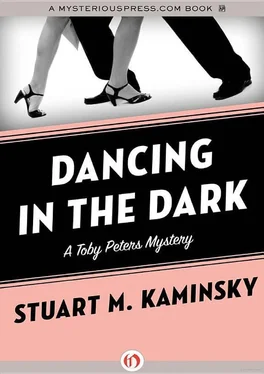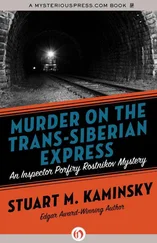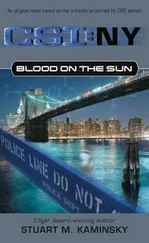Stuart Kaminsky - Dancing in the Dark
Здесь есть возможность читать онлайн «Stuart Kaminsky - Dancing in the Dark» весь текст электронной книги совершенно бесплатно (целиком полную версию без сокращений). В некоторых случаях можно слушать аудио, скачать через торрент в формате fb2 и присутствует краткое содержание. Жанр: Криминальный детектив, на английском языке. Описание произведения, (предисловие) а так же отзывы посетителей доступны на портале библиотеки ЛибКат.
- Название:Dancing in the Dark
- Автор:
- Жанр:
- Год:неизвестен
- ISBN:нет данных
- Рейтинг книги:4 / 5. Голосов: 1
-
Избранное:Добавить в избранное
- Отзывы:
-
Ваша оценка:
- 80
- 1
- 2
- 3
- 4
- 5
Dancing in the Dark: краткое содержание, описание и аннотация
Предлагаем к чтению аннотацию, описание, краткое содержание или предисловие (зависит от того, что написал сам автор книги «Dancing in the Dark»). Если вы не нашли необходимую информацию о книге — напишите в комментариях, мы постараемся отыскать её.
Dancing in the Dark — читать онлайн бесплатно полную книгу (весь текст) целиком
Ниже представлен текст книги, разбитый по страницам. Система сохранения места последней прочитанной страницы, позволяет с удобством читать онлайн бесплатно книгу «Dancing in the Dark», без необходимости каждый раз заново искать на чём Вы остановились. Поставьте закладку, и сможете в любой момент перейти на страницу, на которой закончили чтение.
Интервал:
Закладка:
In the twenties, with his honor Mayor George Cryer, who looked a little like Woodrow Wilson, presiding, there had been a boom, probably like no boom in American history.
In the twenties, Fred and his sister, Adele Astaire, were running across a stage in Los Angeles and waving their arms in the air. The audience loved it.
In the twenties, the University of California at Los Angeles sprang sprawling from the earth of Westwood. The Mulholland Highway was built. City Hall rose white and curious downtown. People moved in, speculated. Bought a house in the morning. Sold it at a profit that night. People had money and smiles on their faces. More than once at Beneva’s Pharmacy, half a block down from my dad’s grocery, I’d watched Mr. Pope line up the Coca-Colas on the counter for a group of real-estate salesmen. Then, one by one, he’d drop a five-grain Benzedrine tablet in their drink to, as Mr. Pope said, “perk ’em up and keep ’em on the happiness track.”
Fred and Adele were touring the country, with Fred singing “Fascinating Rhythm” and dancing to “S’Wonderful.”
In the twenties, there was money to be made and laws to be broken. Jazz and Prohibition hit Los Angeles. Bookmakers, gamblers, and prostitutes set up shop and handed out cards. Morality laws, alcohol laws, gangs moving in. Even in Glendale, where I was a kid cop, there were opportunities on the street to earn enough fast money to buy a house and make your wife happy. I had two partners when I was on the force. Both were on the take. Both thought they had good reasons. I was young and had a brother on the Los Angeles Police Department who would break your fingers if you tried to slip him green paper. But there weren’t many Phil Pevsners on the police force. It was a golden opportunity for Fingers Intaglia to change his name and come to the boom town as the official representative of Detroit’s Purple Gang and the son-in-law of Guiseppi Cortona.
In the twenties, Fred Astaire, wearing a striped beret and matching socks, was back on Broadway playing the accordion, leaping to “New Sun in the Sky,” and doing a dream ballet to “The Beggar’s Waltz.” The papers said he had bought a $22,000 Rolls Royce which he never drove.
Police captains grew rich; patrolmen and detectives didn’t do badly either. In 1923, in an attempt to purge the police department, the city of Los Angeles hired August Vollmer, then chief at Berkeley and hailed as the incorruptible father of modern police science, to head the department, clean it up. He had one year to do it. He started the Los Angeles Police Department school, and one of its first graduates was James Edgar “Two Gun” Davis, who two years later became L.A. Police Chief, followed by Roy “Strong Arm Dick” Steckel. There were raids in 1923, lots of them, but the big-buck bad guys had taken a one-year vacation, leaving the small operators-who had to keep making a living-to get their wares busted and one-way tickets out of town or into prison. Success for Vollmer, and then his term came to an end in September 1924. Just before his one-year term ended, billboards began springing up, reading, “The First of September will be the Last of August.” And it was. Things were back to normal, and people like Arthur Forbes, the former Fingers Intaglia, simply raised their prices and doubled their payoffs, and took over the operations of the smaller gangsters who were behind bars or back in Dayton or Troy terrorizing the locals. Arthur Forbes bought buildings and people and land and more cops.
Those with dollars in their pockets and those with no dollars, to work for those with dollars. The Mexican border was wide open.
Then the Depression hit. Latins, even if they were American citizens, were rounded up, herded on trains, shipped over the border, and told they would be jailed or shot if they returned. Illegal border checks, the bum’s brigade, were set up on the major highways and roads. And if the cop on the border didn’t like your face or your wife’s or the amount of money in your pocket, he could turn you back. Chinatown was shut down and leveled after a vigorous campaign by Harry Chandler, publisher of the Los Angeles Times. The Chinese scattered, most of them going east, reverse Oriental Oakies. Union Station went up in their place, and in 1938 a new, much smaller seven-acre tourist attraction called China City went up fast, giving jobs to voters, none of whom were Chinese. You could get a phony rickshaw ride around China City for a quarter. A year after it opened, China City mysteriously burned down to the ground, putting the remaining Chinese who had become tourist attractions out of work.
But now we had Fred Astaire on the screen in the dark, smiling, dancing, Flying Down to Rio, singing, getting Ginger. He looked like one of us. He could dance as if he had found a way to defeat gravity and fatigue. And nothing bothered him. Getting off a train with Victor Moore, walking down the street in a tux with empty pockets, Fred could always see the bright side.
In L.A., the Arthur Forbeses were grabbing more land cheap and keeping whole precincts happy. People were hungry. There were lines at Clifton’s Cafeterias, the cafeterias of the golden rule, where all you had to do was refuse to pay your bill for any reason and you wouldn’t be charged.
And Fred Astaire tilted his little sailor cap over his right eye, hitched up his bell-bottom trousers, and danced around the deck of an R.K.O. battleship, telling us it was okay to “put all our eggs in one basket.”
What mattered was a job, any job. The county started to build sewers and highways, using federal and state funds and bonds bought generously by the people who still had money, people like Arthur Forbes who legally began to buy the city. But people were working. Working the sewer detail in a gas mask for the Los Angeles Department of Public Works was a great opportunity.
And Fred in a suit and tie and a pair of brown-and-white shoes leaped over a low railing onto a dance floor, took Ginger’s hand, started his feet tapping, and advised us with a smile to “Let Yourself Go.”
And there were disasters. Major floods in 1934 and 1938 from sudden ten-inch downpours that lasted only a few hours. The Los Angeles River went over its banks, driving people from their houses in a wild search for anything that would float. A major earthquake struck around Long Beach and Compton. And fires. Mostly fires. In 1938 the Baker Block, built in the 1870’s, a major tourist attraction, was hit hard by fire.
And Fred in elegant tie and tails, arms floating to the music like a magician, said, “The hell with it. Hum ‘The Picolino,’ dance ‘The Carioca’ and ‘The Continental.’ ”
When I got to the gate at R.K.O., a guy in a gray uniform, complete with black-leather strap over his shoulder and matching cap fixed evenly down to his eyebrows, walked out of the guard booth and motioned for me to roll down the window. The look on his well-shaved face made it clear that he didn’t like leaning down so far and he didn’t much understand who would be trying to get through the R.K.O. gate in a battered refrigerator on wheels.
“Yes, sir?” he said, but I somehow felt that the “sir” had a professional tinge of contempt.
“Name’s Peters, Toby Peters. I have an appointment with Fred Astaire.”
The guard nodded. His body and head squared, face flat and gray, the smell of retired cop on his Sen-Sen breath.
“Astaire’s gonna teach me to dance,” I explained.
The guard looked at me and nodded. A pro. No expression, just a brief blink of the eyes.
“I’ll check,” he said. “Meanwhile, please just sit where you are.”
Since my only option, now that there was another car behind me, was to crash through the gate, I sat. The clink under the hood had grown worse. The seat next to me smelled like cat and I sat inside wearing some reasonably clean trousers, a tieless white shirt that I had tried, with some success, to flatten out with Gunther’s iron.
Читать дальшеИнтервал:
Закладка:
Похожие книги на «Dancing in the Dark»
Представляем Вашему вниманию похожие книги на «Dancing in the Dark» списком для выбора. Мы отобрали схожую по названию и смыслу литературу в надежде предоставить читателям больше вариантов отыскать новые, интересные, ещё непрочитанные произведения.
Обсуждение, отзывы о книге «Dancing in the Dark» и просто собственные мнения читателей. Оставьте ваши комментарии, напишите, что Вы думаете о произведении, его смысле или главных героях. Укажите что конкретно понравилось, а что нет, и почему Вы так считаете.












